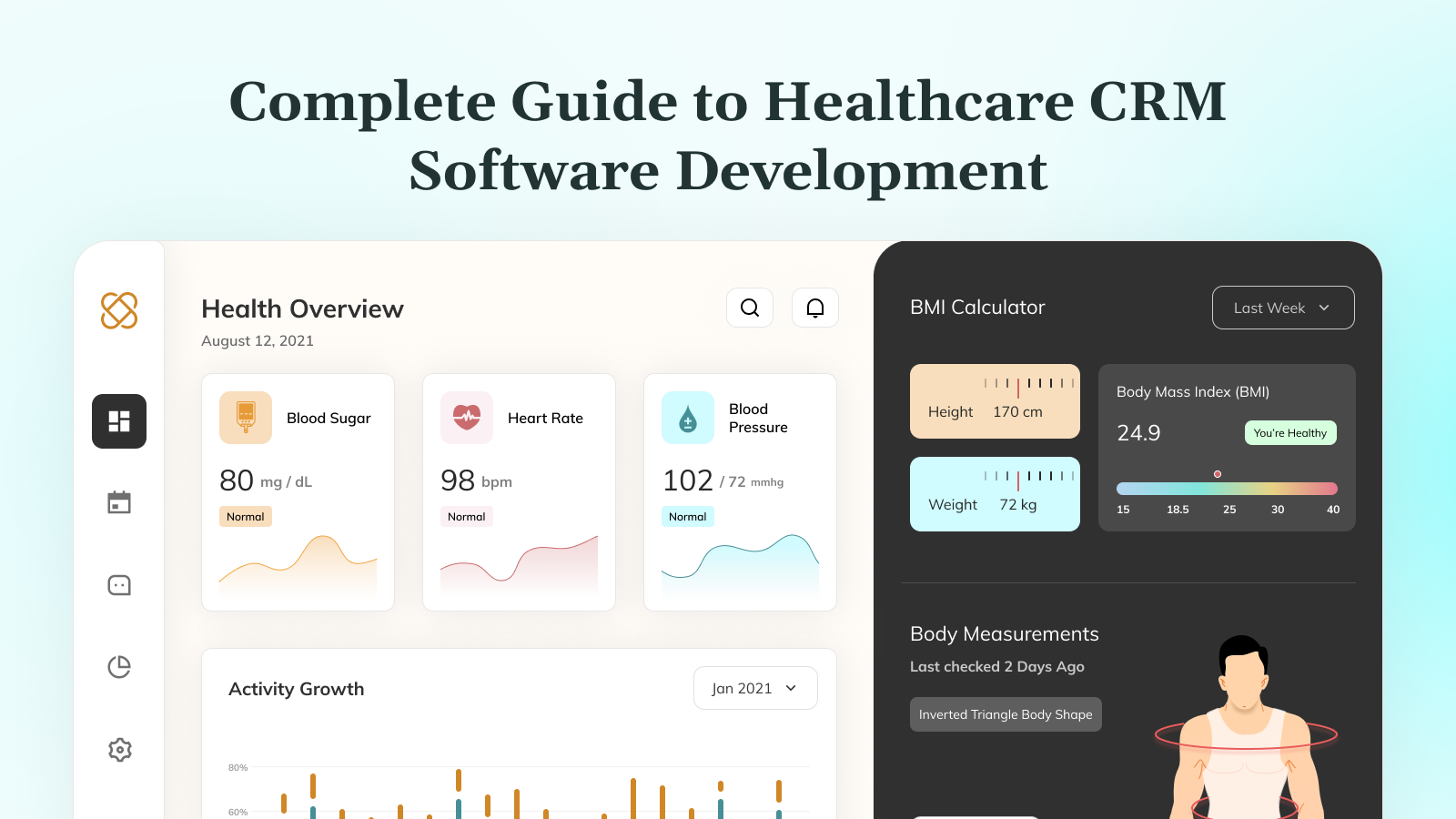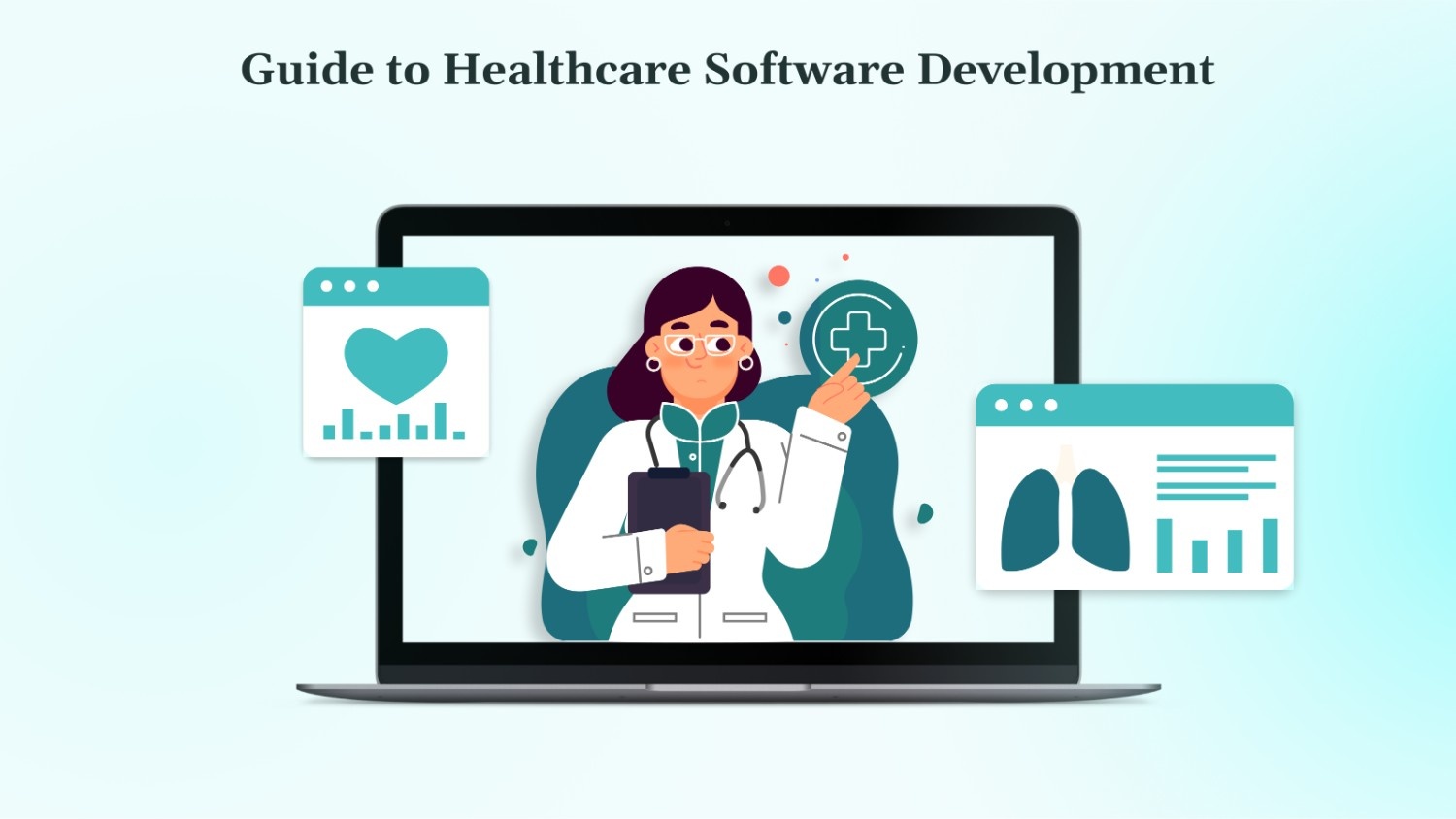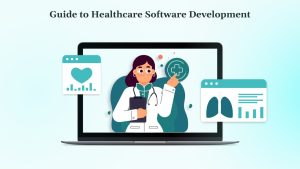Connecting with patients efficiently is essential for hospitals, clinics, and wellness providers. Healthcare CRM software helps streamline operations, personalize care, and strengthen patient relationships. By centralizing data and automating workflows, these platforms reduce administrative tasks and improve communication.
This guide outlines the key steps for developing effective CRM solutions tailored to modern healthcare organizations. Understanding these processes enables providers to create systems that enhance patient engagement, improve care coordination, and support better health outcomes. Whether you’re a healthcare professional or technology partner, this guide offers valuable insights for successful CRM development.
Key Takeaways
- Centralizes all patient data (medical history, appointments, preferences) in one secure system, supporting more informed, coordinated, and personalized care.
- Streamlines appointment scheduling, reminders, and follow-ups, thereby reducing no-shows and the administrative workload for both staff and patients.
- Enables secure, multi-channel communication (email, SMS, telehealth, in-app messaging), improving patient engagement and satisfaction.
- Supports regulatory compliance and data security (HIPAA, GDPR) with features like end-to-end encryption and role-based access controls.
- Provides actionable analytics and reporting, helping organizations monitor care quality and patient experiences and optimize operational efficiency
Understanding Healthcare CRM and Its Importance
Healthcare CRM software centralizes critical patient information and communication in one secure system. This streamlines care delivery and improves coordination across healthcare teams.
What Is Healthcare CRM (Customer Relationship Management)?
A healthcare CRM is a digital platform for managing relationships between providers and their patients. It stores key details, helps automate reminders, and facilitates targeted communication.
- Centralizes medical history, appointments, and preferences.
- Connects staff, patients, and administrators seamlessly.
- Supports proactive outreach and patient support.
This sets the foundation for successful project definition.
Selecting the Right Healthcare CRM Development Partner
Choosing the right development partner is critical for delivering an efficient, compliant, and user-friendly healthcare CRM solution. A reliable partner brings industry expertise, technical skill, and ongoing support to ensure your project’s success and long-term value.
What to Seek in a Healthcare CRM Development Partner
- Health Industry Experience
- Deep familiarity with clinical workflows and patient data security
- A solid history of delivering HealthTech projects
- Compliance and Regulatory Rigor
- Proven expertise in HIPAA, GDPR, HITECH, and industry security
- Regular internal audits and secure coding standards
- Technical Skillset
- Proficiency in full-stack development, API integrations, and scalable cloud architecture
- Experience with AI/ML and analytics
- Project Communication
- Transparent, detailed documentation and regular progress reporting
- Agile methodology for iterative releases
Why This Matters
A strong technology partner aligns with business vision and adapts solutions to changing requirements. Vendor choice impacts post-launch support, upgrade paths, and the overall user experience. DEVtrust exemplifies these principles, delivering comprehensive HealthTech solutions with a sustained partnership focus.
The selected team will next collaborate on design.
Designing User-Friendly Interfaces and Experiences
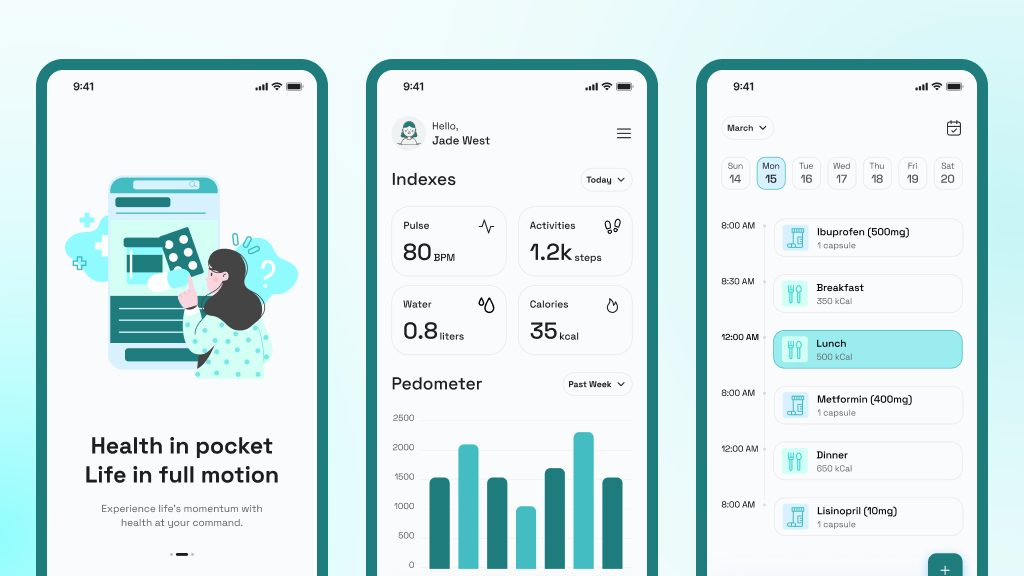
Modern healthcare CRMs must deliver intuitive, clean interfaces that simplify every step for staff, providers, and patients.
Principles of Effective Healthcare CRM Design
- Clarity First: Prioritize simple layouts, clear labels, and responsive elements
- Accessibility: Ensure compliance with accessibility standards (WCAG), proper on all devices
- Focused Dashboards: Role-based dashboards deliver relevant data to each user
- Guided Navigation: Minimal learning curve with step-by-step screens and tooltips
Enhancing Patient Experience
- Provide mobile access and patient portals for engagement
- Enable secure chat and video consultation features
- Empower patients to self-schedule, update information, and access results
Supporting Staff
- Automated reminders and alerts reduce time spent chasing paperwork
- Quick-access menus streamline daily routines
- Visually organized appointment calendars avert scheduling errors
Thoughtful design bridges the gap between technology and care, improving outcomes and user satisfaction.
Design informs which features and modules are most important.
Essential Features and Functional Modules
Healthcare CRM success depends on essential, well-integrated modules. Each feature builds toward greater automation, better communication, and heightened accuracy.
Must-Have CRM Features
| Core Module | Purpose | Benefits |
| Patient Profile Management | Store all patient records | Quick access, complete view |
| Appointment Scheduling | Book, reschedule, and track | Fewer no-shows, better planning |
| Secure Messaging | Chat and notify securely | Confidential, real-time updates |
| Telehealth Module | Virtual visits and consultation | Convenience for all parties |
| Billing & Payment Tracking | Manage invoices and payments | Transparent, on-time billing |
| Task Automation | Routine messages, notifications | Reduce manual work |
| Document Management | Upload and access clinical docs | Fast retrieval and sharing |
| Analytics & Reporting | Generate insights and trends | Data-driven improvement |
Advanced Features
- AI-driven appointment and medication reminders
- Custom patient segmentation for tailored care
- Role-based permissions to secure sensitive data
Each feature must be easily accessible, quick to use, and designed with both compliance and security in mind.
Security is foundational for any healthcare CRM solution.
Ensuring Robust Data Security and Privacy Compliance
Patient data security cannot be compromised. Complying with privacy laws and securing medical records helps protect patient trust and the organization’s reputation.
Security Measures
- End-to-End Encryption: Safeguards data in transfer and at rest
- Role-Based Access Control: Limits system access to authorized staff
- Continuous Security Audits: Detects and patches vulnerabilities early
- Multi-Factor Authentication: Adds an extra layer for logins
Compliance Considerations
- Follow HIPAA (US), GDPR (Europe), and region-specific mandates
- Implement strong consent management for patients
- Document all security policies and responses
Risks of Inadequate Security
- Data breaches can lead to fines and reputational damage
- Patient trust erodes following publicized security failures
- Non-compliance invites regulatory action and operational disruption
By championing security and compliance, a healthcare CRM becomes a trusted hub for sensitive data..
Integration with Existing Healthcare Systems
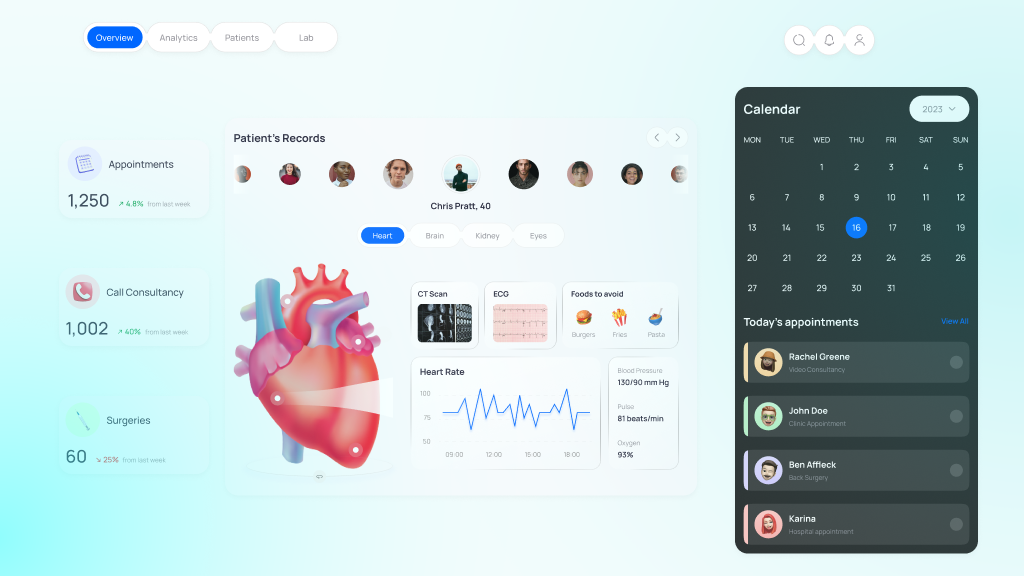
Most clinics and hospitals rely on several software tools. CRM software should connect seamlessly for true efficiency.
Key Integration Points
- EHR and EMR Platforms: Sync patient data, appointments, and medication records
- Billing and Finance Systems: Automate invoicing, insurance, and payment processing
- Telehealth Platforms: Integrate for video consults and remote care
- Communication Tools: Link email, SMS, and patient apps for outbound messaging
Over 90% of hospitals now use electronic health records (EHRs), powerful platforms for managing clinical and regulatory data. However, EHRs are not designed for patient engagement or communication workflows.
That’s where CRMs come in. Integrated with EHRs, a CRM enables proactive communication, automated follow-ups, secure messaging, and streamlined scheduling, ensuring better engagement, lower drop-offs, and a unified patient experience.
Benefits of Integration
- Eliminates re-keying and duplicate entry errors
- Provides a unified view for medical teams
- Accelerates response times during patient encounters
- Reduces operational silos and wasted effort
APIs power most integrations, so standardized API support is essential in any modern healthcare CRM.
Smooth integration paves the way for thorough testing.
Testing and Quality Assurance
Rigorous testing ensures every CRM deployment is safe, stable, and succeeds in real-world healthcare settings.
Phases of QA for Healthcare CRM
- Unit Testing: Validate individual software components
- Integration Testing: Confirm interoperability with existing systems
- Security Testing: Simulate real-world threats and ensure defenses
- User Acceptance Testing (UAT): Gather feedback from actual users before go-live
- Performance Testing: Stress-test the CRM under high loads
QA Best Practices
- Develop test cases based on real clinical workflows
- Automate regression testing where possible
- Document all issues and resolutions
Thorough QA reduces support costs, boosts satisfaction, and protects compliance status.
Well-tested systems next rely on strong staff training.
Training Staff and Change Management
New technology is only effective when staff are confident and engaged. Comprehensive training and effective change management facilitate seamless adoption.
Building a Training Program
- Create easy-reference guides, videos, and FAQs
- Offer hands-on workshops and role-based sessions
- Provide ongoing staff support via helpdesks or chat
Best Change Management Tactics
- Involve end users early to gather input
- Celebrate quick wins and lessons learned
- Communicate timelines, benefits, and best practices
- Appoint “change champions” to liaise and motivate teams
Avoid assuming quick mastery. Continuous support and feedback lead to widespread adoption and fewer disruptions.
After implementation, continuous improvement becomes the focus.
Post-launch monitoring and Continuous Improvement
A CRM journey does not end at deployment. The best systems evolve with provider and patient needs.
Monitoring Essentials
- Real-Time Analytics: Monitor user activity, system health, and performance
- Feedback Channels: Collect insights from all user groups (staff, patients)
- Usage Metrics: Track which features are popular and where improvements are needed
Continuous Improvement Cycle
- Hold regular review meetings to assess progress
- Prioritize valuable new features and integrations
- Patch issues promptly to maintain reliability
Examples of Continuous Improvement
- Adding secure telehealth after-market shifts
- Enhancing dashboards based on clinician suggestions
- Regular security upgrades as threats change
Continuous monitoring ensures that CRM systems remain adaptable, competitive, and aligned with industry expectations.
Case Study: Precina – Simplifying Medication Management
Precina partnered with DEVtrust to tackle issues like poor medication adherence, fragmented app experiences, and a lack of real-time health tracking. Patients struggled with managing chronic conditions such as diabetes and hypertension due to manual workflows and limited data access. DEVtrust implemented reminder notifications, real-time syncing, and secure logins to streamline the experience.
As a result, Precina saw a 98% reduction in manual effort and a 95% boost in user trust. Document handling speed improved by 97%, and care team productivity increased by 92%. The CRM-powered platform now supports better health outcomes, improved app engagement, and seamless care coordination.
Case Study: Spero Institute – Enhancing Therapy Management
Spero Institute partnered with DEVtrust to simplify therapy workflows, including tracking progress, scheduling, and document sharing. Patients and clinicians faced issues with secure access, group messaging, and non-intuitive interfaces. DEVtrust created a role-based login system, a DBT progress tracker, and streamlined scheduling with built-in video calls.
The new CRM-powered platform improved document management and therapy coordination. Security and messaging features strengthened clinician-patient connections, resulting in smoother sessions and enhanced visibility into patient progress. The solution now enables more effective, personalized mental health care delivery.
Why DEVtrust Is a Leader in Healthcare CRM Software Development
DEVtrust offers the expertise and experience vital for modern healthcare CRM initiatives. The company’s approach uniquely blends technical depth, regulatory rigor, and business-first thinking.
DEVtrust HealthTech Capabilities
- Custom-built, HIPAA-compliant CRM platforms
- Advanced API integration with leading EHR, payment, and telehealth tools
- Role-based dashboards and mobile-friendly designs
- Cloud-first, scalable solutions that adapt as organizations grow
- Proven track record in secure, seamless system integration
Commitment to Delivering Results
DEVtrust brings a history of successful HealthTech projects, firm support, and ongoing partnerships. Clients benefit from the company’s:
- Transparent, agile project management
- Proactive feature recommendations
- Deep understanding of clinical operations
Choosing a trusted partner like DEVtrust positions healthcare providers to deliver better care, optimize operations, and build future-ready digital ecosystems.
Conclusion
Healthcare CRM software development is not just about implementing a tool—it’s about enabling better care, streamlined operations, and stronger connections between providers and patients. When built with the right strategy and long-term vision, a CRM becomes a key driver of healthcare transformation.
At DEVtrust, we develop secure, user-focused CRM platforms tailored to real clinical workflows and regulatory standards. Our custom solutions enable care teams to operate more efficiently, deliver personalized experiences, and remain agile in a rapidly evolving healthcare landscape.
Ready to transform your healthcare operations and patient engagement? Contact DEVtrust today for a personalized consultation and start building a CRM solution that truly meets your organization’s needs.
Complete Guide to Healthcare CRM Software Development
Boost patient experiences with top-notch healthcare CRM software development. Streamline processes, automate tasks, and ensure data security. Contact us now!
Contact Us